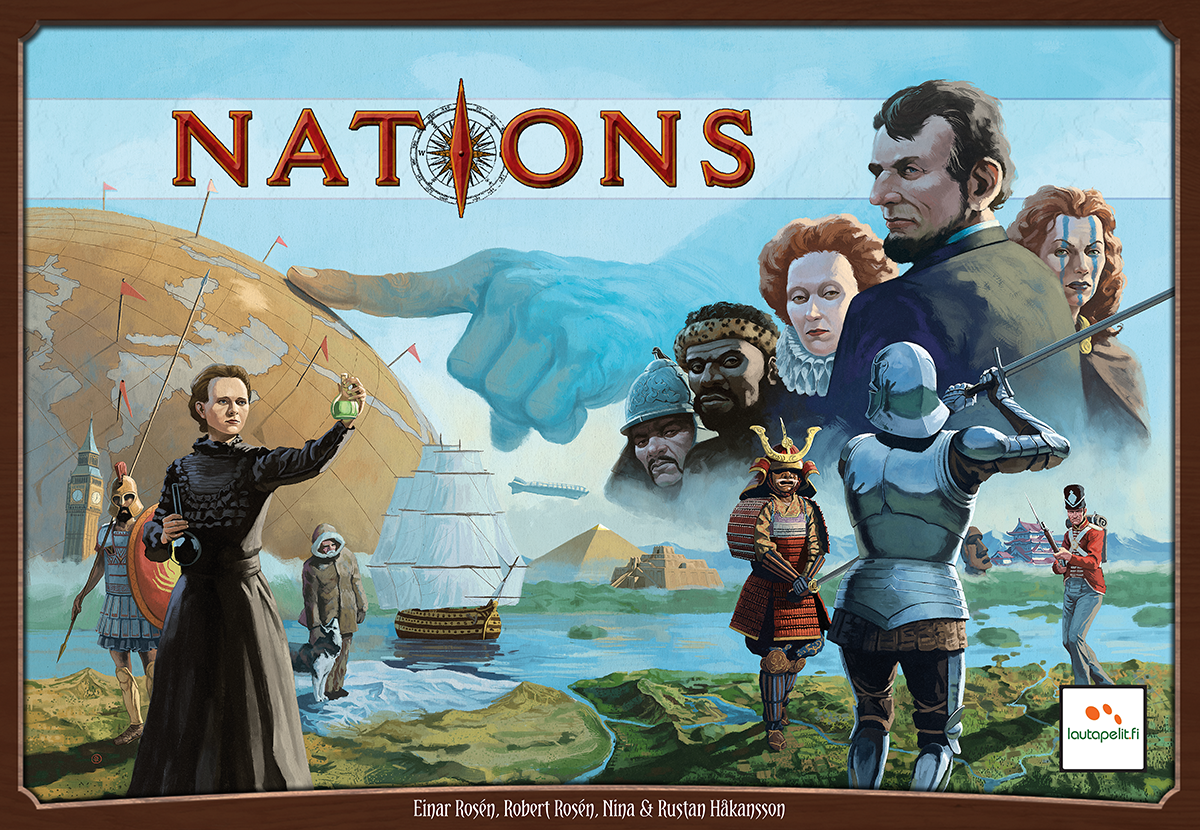As Game Day is still weeks away, I couldn't resist breaking out Nations and giving it a solo run on my own. I will try not to go into the nitty gritty bits of the game as I don't want to bore you unnecessarily (plus if you're really interested, you'd have read the rulebook already anyway) and on top of that, the solo version varies from the normal game in a few areas.
Game(s) Played:
Nations
Session – Nations
Player(s):
Hayen
The lives of the Persians have come under my rule and it is my decisions that will determine if the Persians will fulfil their potential and become the great civilization that they are destined to be.

As you can see, I diversified my workers across the board & completed the first stage of my first wonder - the Colosseum. Buildings (Blue) & Military (Red) cards are useless unless you have a worker on it to "produce" the desired effects at the top of the card. Placing workers & building wonders require resources (essentially what looks like coal).

This is the progress board before I grabbed the Lighthouse & the Colosseum. The cards in the higher row cost more money (guess science has gone out the window) to purchase & the new cards replace any slot on your Player Board & automatically removes all the workers there.

The score board tracks a fair few number of things namely military might, stability, player order, the current age & your accumulated books (knowledge I guess). Military determines Player Order & the outcome of wars (which cause you to lose resources if you lose).

Finding the food requirement to be rather steep due to the famine (lose food) during each end of age, I swap my Farm & Caravan for the Windmill & Aqueduct. In the meantime, I've managed to colonize Macedonia & complete the Colosseum. You will also notice that I have obtained an extra worker (in the bottom left) at the cost of 3 food a turn.

In the medieval age, I've started the Sankore University & bought the Monastery building card looking to boost my Books (which gives VPs at the end of each turn) & finally recruited an Advisor called Sejong the Great (never heard of him) for his food generating abilities

This is Age III, the Renaissance Age, which came with a fair amount of goodies, but with my limited budget in hand, I could only grab the Courthouse (more books!) & upgrade my Advisor to the more well known & more useful Montezuma. He gives the same permanent benefit as Sejong the Great but gives bonus books for buying War cards. Constantly waging warfare is actually a legitimate strategy in Nations, where the strongest keeps going first in turn order & constantly beats down the other Players.

Between the second half of Age III & IV, I hit the infamous rut of just trying to meet the food requirements of each turn with little opportunity to grow (add workers) because I needed the bonus resources each turn (you choose either the bonus or growth). I did manage to add one worker and start the Suez Canal wonder (which would have been too little too late). That kind of return (1 wonder & 1 worker) over two turns is kinda pathetic though.

So I did manage to complete the Suez Canal & grow another worker (after calculating that I could afford the last turn's food requirements)
Time Taken: 120 minutes
Results Of Game(s)
Game VP – 16 VPs (Books, Stability & Golden Ages (yellow cards) contribute to this)
Colonies – 0 VPs
Wonders – 4 VPs
Buildings & Military – 9 VPs (Buildings & Military cards give VP based on the number of workers on the card)
Resources – 5 VPs (1 VP for every 10 resource tokens)
Total = 34 VPs (Pericles level! - Apparently that's level 5 just below Cleopatra level)
Rating: 8/10
Let's get the contentious topic out of the way, Nations is not as epic as Through The Ages both in terms of scope & that feeling you get when you're done, let out a big sigh to release all the pent up tension then say "let's do another round". What Nations is, is a streamlined version of Through The Ages with simpler upkeep, simpler resolutions of warfare & simpler production (no obsolete farms/mines lying around). What Nations manages to retain is that feeling of juggling an ever increasing number of kitchen knives whilst managing your civilization, it also retains the fact that it is an incredible pain to set up & has questionable production values.

See those teeny tiny marks on the bottom left of the cards? That's what separates the advance & expert buildings from the base set
I suspect Nations is great for getting that Through The Ages itch when 4 people want to play at the same time (something most people tend to avoid when considering Through The Ages), but I wouldn't know until I actually play the game with 4. Let's look forward to that.

No comments:
Post a Comment